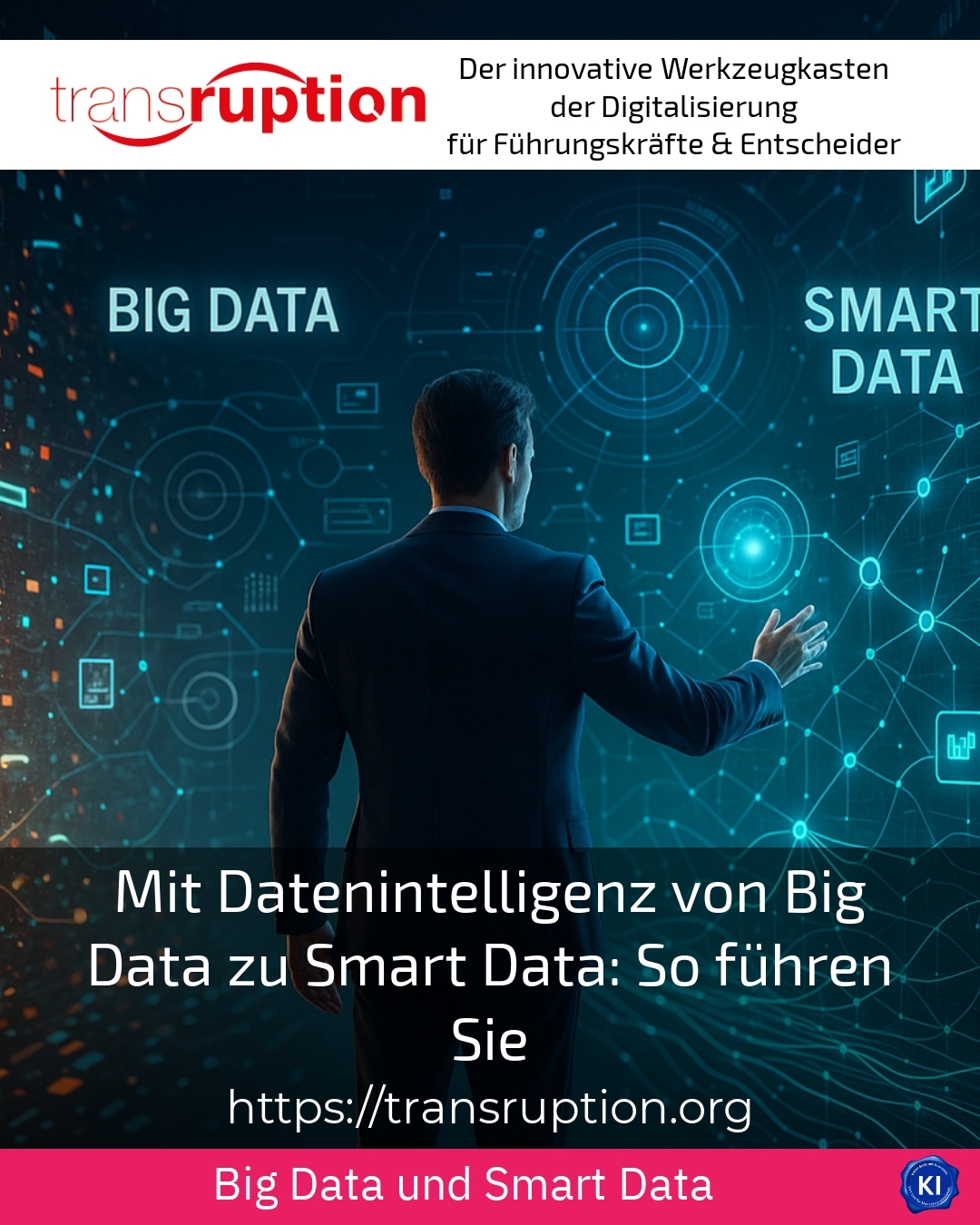In today's digital world, the term Data intelligence has become indispensable. Companies are confronted with enormous amounts of data, known as big data. The key lies in transforming this raw data into so-called smart data that enables efficient and well-founded decisions. Data intelligence helps organisations to gain qualitative added value from the masses and provide sustainable impetus for processes and innovations.
Data intelligence: From a vast sea of data to a valuable treasure trove of knowledge
Big data describes huge amounts of data that are generated daily in companies in a variety of ways and at high speed. Examples include payment transaction data in finance, sensor data in industrial production or customer interactions in retail. The challenge lies in filtering out only the data that is really relevant and provides a clear picture. This is precisely where data intelligence comes in: it helps to refine the raw material of big data and convert it into smart data that represents structured, reliable and actionable information.
For example, a retail company uses data intelligence to analyse the purchasing behaviour of different customer groups. This enables personalised marketing campaigns that better address the needs of customers and thus increase sales. Similarly, a car manufacturer uses data intelligence to optimise its production processes: sensors continuously supply data on machine statuses so that maintenance can be planned in advance and downtimes minimised.
In the healthcare sector, data intelligence and smart data are leading to more personalised treatment approaches. Large volumes of patient data from electronic files, laboratory results and wearables are being processed so that doctors can make informed decisions more quickly. This reduces costs and significantly improves the quality of treatment.
Practical ways to implement data intelligence
Data intelligence does not require magic, but the right approach. The following steps help companies to turn big data into smart, usable data:
- Data integration: Different sources such as CRM systems, IoT devices or external data services are linked together.
- Data cleansing: Inconsistent or incorrect information is sorted out or corrected.
- Data analysis and algorithms: Statistical models and artificial intelligence are used to recognise patterns and create forecasts.
- Visualisation: The most important findings are clearly presented on dashboards.
- Data protection and governance: Clear rules ensure that sensitive data is handled responsibly.
For example, an energy supplier uses smart meter data to predict the energy consumption of its customers. With the help of data-intelligent analyses, the company was able to avoid grid bottlenecks and at the same time optimise the integration of renewable energies. In addition, a dynamic price adjustment was created, which both reduced costs and improved customer satisfaction.
A provider in the field of medical technology is now also automating the analysis of large image data sets. The combination of AI and data intelligence significantly reduces the susceptibility to errors in diagnostics and supports treating specialists with contextualised information.
BEST PRACTICE at the customer (name concealed due to NDA contract) The introduction of data intelligence in production led to a significant reduction in unproductive downtimes. Thanks to real-time data monitoring and continuous optimisation of machine parameters, maintenance intervals could be precisely coordinated and expensive unplanned downtime avoided. In addition, product quality was improved through targeted control of key production steps.
Data intelligence as the key to sustainable success in the company
The permanent availability of large amounts of data harbours opportunities, but also risks. Data intelligence provides support here by enabling companies to make quick decisions based on verified information. Particularly in sectors such as finance, trade, industry, energy and healthcare, this can increase efficiency and secure a competitive edge.
Clients often report that although they have technical solutions for data collection, they need support with the interpretation and actual use of the data. Transruption coaching provides support at precisely this point. It provides impetus for the correct handling of data intelligence, helps with the selection of suitable methods and technologies and promotes a holistic data strategy that fits the business model.
BEST PRACTICE for the customer (name withheld due to NDA agreement) In the public sector, data-intelligent analyses have improved the quality of service in the allocation of resources. This provides authorities with a clear basis for decision-making in order to track economic developments and provide services to citizens more efficiently.
Another example comes from the insurance industry. Here, data intelligence helped with risk assessment and fraud detection. The combination of real-time data and algorithms led to more precise tariffs and significantly reduced losses due to insurance fraud.
My analysis
Data intelligence is at the centre of the successful transformation from big data to smart data. Its strength lies in targeted processing and analysis, which allows companies to make data-based decisions more efficiently and accurately. Practical examples from industry, healthcare, retail, energy and the public sector make it clear that data-intelligent working opens up a wide range of fields of application. It also shows that consulting solutions such as transruptions coaching offer valuable support in anchoring data strategies sustainably and thus securing competitive advantages.
Further links from the text above:
[1] Big data explained simply: definition and meaning
[2] What is Data Intelligence? Use cases
[3] Data intelligence: big data and smart data for decision-makers
[4] Practical example of the use of data intelligence
[8] Data intelligence: How decision-makers use big & smart data
[9] Smart data: definition, application and difference to big data
[10] Data intelligence or the art of turning data into gold
For more information and if you have any questions, please contact Contact us or read more blog posts on the topic TRANSRUPTION here.















